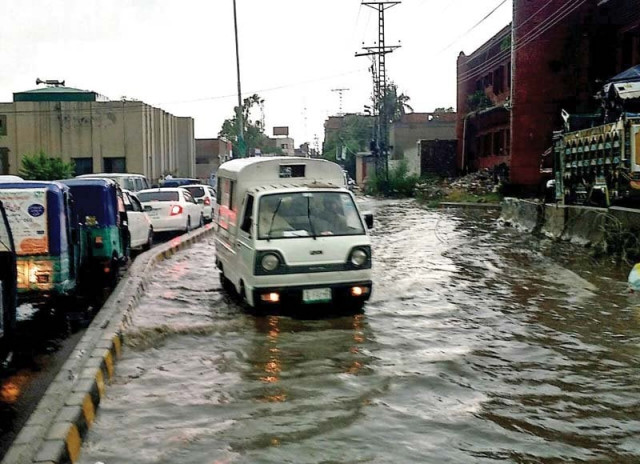More than a splash: Small rain causes big problems for the city
Locals forced to wade through water owing to ineffective drainage system

Vehicles stranded in rain water in the city. PHOTO:EXPRESS
Now they have demanded a solution to the urban flooding problem. A few drops of rains on Thursday paralysed routine life as hundreds of cars were stranded on the roads for hours. Stagnant rain water was seen on all the bustling roads of the city.
In the interior of the provincial metropolis, rainwater was left standing in Gulbahar and Gulberg. It even entered houses located in the narrow streets of Androon Shehr and made life miserable for locals.
Rainwater was stagnant on Khyber Road, Sher Shah Sori Road, University Road and almost all minor roads inside Hayatabad Township.
Arshad Yousafzai has a motorbike mechanic shop in Gulberg. He told The Express Tribune water entered his workplace every time it rained. He pleaded with the government to resolve the matter.
An official, requesting anonymity, said WSSP had been told by the meteorological department that rainfall was likely to increase by 10-20% in the monsoon this year. The Met department official said Peshawar’s drainage system would be unable to disperse water in such conditions.
Sources privy to the matter told The Express Tribune that work on modern drains was moving at a snail’s pace and was unlikely to be completed before monsoons expected in July and August.
They added the under-construction Muhammadzai Nullah will solve problems for households on both sides of GT Road. However, its completion will take time.
The main cause of urban flooding in the city was polythene bags and other solid materials that stuck in gratings constructed on the roads, WSSP Communications Officer Taimoor Shah said.
In an effort to disperse water through the existing drains, the government has increased the penalty on throwing garbage on roads and polythene into canals. The latter interrupts the flow of water being drained out of the city.
According to the Khyber-Pakhtunkhwa Canal and Drainage Act-2015, the penalty has been increased from Rs50 to Rs20,000 along with two years’ imprisonment. Encroachments on both sides of canals and diverting sewerage lines to them have been banned by the authorities.
While taking to The Express Tribune, Shah said another reason of stagnant water was the increase in urban population. Naturally, this has resulted in the generation of more waste.
He said WSSP’s responsibly was maintenance of the drainage system and they are working to figure out storm water issue on roads. He said dedicated drainage system for storm has been proposed to figure out the issue.
The Pakistan Tehreek-e-Insaf-led provincial government inaugurated a modern drainage system in the month of January 2016. Through the new drainage system, to be constructed by Municipal Services Peshawar, four main drains of 13 kilometres would be constructed at an estimated cost of Rs500 million.
The other drains to be completed included Shahi Kattha drain and the main drain from Gul Bahar area. Also to be revamped were sewerage lines laid during the 1990s near Kakshal and Pando main road areas.
An MSP insider told The Express Tribune that the absence of proper mapping and data, such as the size of drains, sewers and relevant hydraulic calculation, led to various complications in rehabilitating the existing system.
He said domestic wastewater of 25 union councils of Town-1 and storm water currently combined to flow into existing drains. This triggered urban flooding in most parts of the city and both needed to be separated.
Published in The Express Tribune, June 20th, 2016.













COMMENTS
Comments are moderated and generally will be posted if they are on-topic and not abusive.
For more information, please see our Comments FAQ